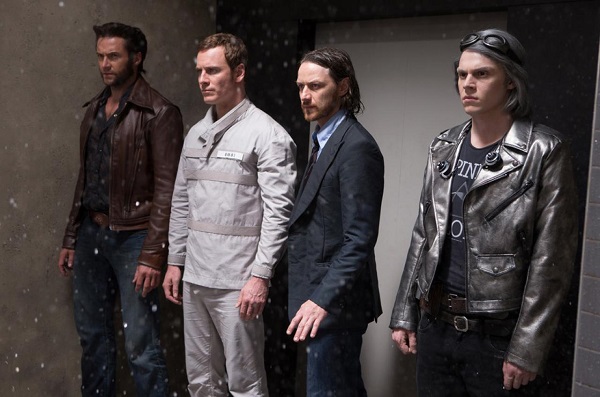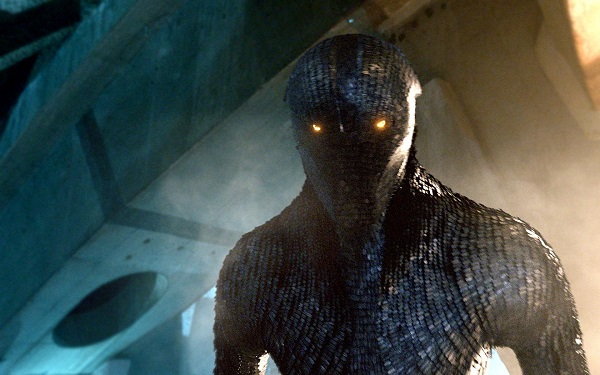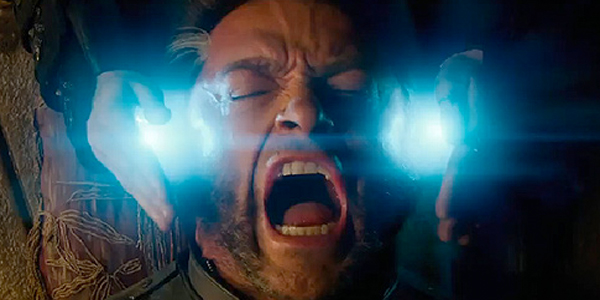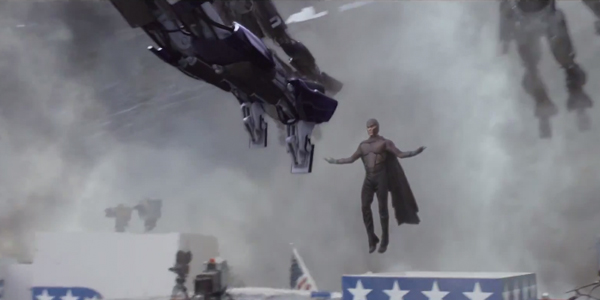X-Men: Days of Future Past Review: A Massive Blockbuster Experience
The 'Days of Future Past' storyline is one of the most famous and celebrated story arcs in the
X-Men series, being adapted twice in cartoons. Now thanks to Bryan Singer, the storyline has been given the cinematic treatment and it is one of the best
X-Men movies so far.
In the future, giant robots known as Sentinels have taken over the world, holding humans in prison camps and hunting the remaining mutants. The Sentinels are able to absorb and counter mutant powers and are seemingly unstoppable. Kitty Pryde (Ellen Page) has developed the power to send people's minds back in time to their younger bodies. The only hope for both humanity and mutant-kind is send Wolverine (Hugh Jackman) back in time to 1973 to prevent the war from ever happening, being the only mutant to survive the process as a team of mutants hold protect the pair.

In 1973 Wolverine has to stop Raven Darkholme/Mystique (Jennifer Lawrence) from assassinating the scientist Bolivar Trask (Peter Dinklage), the creator of the Sentinels and a man who had been experimenting on mutants. His death would trigger the war and Mystique's capture would lead to a breakthrough that makes the Sentinels so dangerous. Wolverine has to reignite a disillusioned Charles Xavier (James McAvoy) who has been suppressing his powers and form a team of mutants to stop Mystique.
After 11 year absence from the director's chair Singer comes back to the series he has been synonymous with and he brings his all his strengths while also keeping the best aspects of
X-Men: First Class.
X-Men: Days of Future Past serves as sequel to the original trilogy, a sequel to
X-Men: First Class and untangles the confusing mess that has become of the franchise's continuity. Singer keeps his darker, more serious approach, particularly for the bleak future to be created and adjusts to the blend of history and sci-fi that worked so well in
X-Men: First Class. The previous movies in the series are reference in some way, particular
X2: X-Men United and
X-Men: First Class and a few wider references for comic book fans to be excited about.
X-Men Origins: Wolverine is noticeable with the absences of clips and ignores its events.

Singer's tone is a little lighter and humorous compared to his previous
X-Men movies when the events go into the 70s. Yet there is still emotional weight and character development that has been the strength of the best of the
X-Men movies as characters interact, clash and debate. One of the central themes is the clash of ideologues between Xavier and Magneto, debating how humanity will treat them and battling for Mystique's soul; made even more important because of their history in the previous movie and Xavier being at his lowest ebb.
Simon Kinberg, the writer of
X-Men: The Last Stand returns to the series, writing one of his best screenplays (considering his filmography, that was not hard). Kinberg and Singer also look at the old time travel theme of fate and destiny, asking if the war with Sentinels is inevitable, that the cause of history cannot be changed. This is similar to
The Terminator series, particularly
Terminator 2: Judgement, and people can easily make that connection: but it should be noted that the comic storyline started in 1981 and
The Terminator was released in 1984. The future of
X-Men: Days of Future Past shares some visual cues from the likes of
The Terminator and
The Matrix, the destroyed cities, the dark skies and the rounding up of people.

One of the most clever inventions of the movie is the use of psychics powers to time travel, avoiding the paradox of someone meeting themselves and allows for two timelines going on symmetrically which brings in a ticking time bomb element to the story. The use of psychic powers also gives the characters from different time period to communicate.
The easy solution would have been Xavier could have read Wolverine's mind and he sees he was telling the truth. This is well explained by Xavier falling into a depression and suppressing his powers, giving him an arc of finding his faith and belief again.
As you would want and expect from a summer superhero movie
X-Men: Day of Future Past has strong action sequences and this movie has some of the best special effect of the franchise. The best are the sequences in the future as the mutants have to fight against an impossible enemy and the use of the Sentinels having adaptation powers makes them an even more potent threat. A similar idea was used in the
Wolverine and The X-Men cartoon. Singer brings in more slo-mo to his action sequences, particularly for Quicksilver (Even Peters) when he runs and slows down time.
 X-Men: Days of Future Past
X-Men: Days of Future Past has a large cast with younger and older versions of appearing and new characters being introduced. Our favorites of Wolverine, the older and younger versions of Xavier and Magneto, Mystique and Beast (Nicholas Hoult) are the characters who have the most screen time and perfectly played by their respective actors. The newer mutants played by actors like Omar Sy and Fan Bingbing get the short straw of screen time but they do have chance to shine in the action scenes. Dinklage is always a welcome presence on screen and Michael Fassbender shines once again as he shows off Magneto's crueller, more ruthless side. And Peters does what he is meant to be: he is a 'pain in the arse'.
X-Men: Days of Future Past combines the best aspects of the first two
X-Men movies and
X-Men: First Class to give fans of the movie series and the franchise as a whole, an excellent X-Men experience.
Pros
- Honors both the original trilogy and X-Men: First Class
- A focus on character development and ideas
- Excellent special effects and action
- Bleak world-building
- Fixes continuity
Cons
- Quicksilver can be a little annoying
- Quicksilver's look was ridiculous
 In 1973 Wolverine has to stop Raven Darkholme/Mystique (Jennifer Lawrence) from assassinating the scientist Bolivar Trask (Peter Dinklage), the creator of the Sentinels and a man who had been experimenting on mutants. His death would trigger the war and Mystique's capture would lead to a breakthrough that makes the Sentinels so dangerous. Wolverine has to reignite a disillusioned Charles Xavier (James McAvoy) who has been suppressing his powers and form a team of mutants to stop Mystique.
After 11 year absence from the director's chair Singer comes back to the series he has been synonymous with and he brings his all his strengths while also keeping the best aspects of X-Men: First Class. X-Men: Days of Future Past serves as sequel to the original trilogy, a sequel to X-Men: First Class and untangles the confusing mess that has become of the franchise's continuity. Singer keeps his darker, more serious approach, particularly for the bleak future to be created and adjusts to the blend of history and sci-fi that worked so well in X-Men: First Class. The previous movies in the series are reference in some way, particular X2: X-Men United and X-Men: First Class and a few wider references for comic book fans to be excited about. X-Men Origins: Wolverine is noticeable with the absences of clips and ignores its events.
In 1973 Wolverine has to stop Raven Darkholme/Mystique (Jennifer Lawrence) from assassinating the scientist Bolivar Trask (Peter Dinklage), the creator of the Sentinels and a man who had been experimenting on mutants. His death would trigger the war and Mystique's capture would lead to a breakthrough that makes the Sentinels so dangerous. Wolverine has to reignite a disillusioned Charles Xavier (James McAvoy) who has been suppressing his powers and form a team of mutants to stop Mystique.
After 11 year absence from the director's chair Singer comes back to the series he has been synonymous with and he brings his all his strengths while also keeping the best aspects of X-Men: First Class. X-Men: Days of Future Past serves as sequel to the original trilogy, a sequel to X-Men: First Class and untangles the confusing mess that has become of the franchise's continuity. Singer keeps his darker, more serious approach, particularly for the bleak future to be created and adjusts to the blend of history and sci-fi that worked so well in X-Men: First Class. The previous movies in the series are reference in some way, particular X2: X-Men United and X-Men: First Class and a few wider references for comic book fans to be excited about. X-Men Origins: Wolverine is noticeable with the absences of clips and ignores its events.
 Singer's tone is a little lighter and humorous compared to his previous X-Men movies when the events go into the 70s. Yet there is still emotional weight and character development that has been the strength of the best of the X-Men movies as characters interact, clash and debate. One of the central themes is the clash of ideologues between Xavier and Magneto, debating how humanity will treat them and battling for Mystique's soul; made even more important because of their history in the previous movie and Xavier being at his lowest ebb.
Simon Kinberg, the writer of X-Men: The Last Stand returns to the series, writing one of his best screenplays (considering his filmography, that was not hard). Kinberg and Singer also look at the old time travel theme of fate and destiny, asking if the war with Sentinels is inevitable, that the cause of history cannot be changed. This is similar to The Terminator series, particularly Terminator 2: Judgement, and people can easily make that connection: but it should be noted that the comic storyline started in 1981 and The Terminator was released in 1984. The future of X-Men: Days of Future Past shares some visual cues from the likes of The Terminator and The Matrix, the destroyed cities, the dark skies and the rounding up of people.
Singer's tone is a little lighter and humorous compared to his previous X-Men movies when the events go into the 70s. Yet there is still emotional weight and character development that has been the strength of the best of the X-Men movies as characters interact, clash and debate. One of the central themes is the clash of ideologues between Xavier and Magneto, debating how humanity will treat them and battling for Mystique's soul; made even more important because of their history in the previous movie and Xavier being at his lowest ebb.
Simon Kinberg, the writer of X-Men: The Last Stand returns to the series, writing one of his best screenplays (considering his filmography, that was not hard). Kinberg and Singer also look at the old time travel theme of fate and destiny, asking if the war with Sentinels is inevitable, that the cause of history cannot be changed. This is similar to The Terminator series, particularly Terminator 2: Judgement, and people can easily make that connection: but it should be noted that the comic storyline started in 1981 and The Terminator was released in 1984. The future of X-Men: Days of Future Past shares some visual cues from the likes of The Terminator and The Matrix, the destroyed cities, the dark skies and the rounding up of people.
 One of the most clever inventions of the movie is the use of psychics powers to time travel, avoiding the paradox of someone meeting themselves and allows for two timelines going on symmetrically which brings in a ticking time bomb element to the story. The use of psychic powers also gives the characters from different time period to communicate.
The easy solution would have been Xavier could have read Wolverine's mind and he sees he was telling the truth. This is well explained by Xavier falling into a depression and suppressing his powers, giving him an arc of finding his faith and belief again.
As you would want and expect from a summer superhero movie X-Men: Day of Future Past has strong action sequences and this movie has some of the best special effect of the franchise. The best are the sequences in the future as the mutants have to fight against an impossible enemy and the use of the Sentinels having adaptation powers makes them an even more potent threat. A similar idea was used in the Wolverine and The X-Men cartoon. Singer brings in more slo-mo to his action sequences, particularly for Quicksilver (Even Peters) when he runs and slows down time.
One of the most clever inventions of the movie is the use of psychics powers to time travel, avoiding the paradox of someone meeting themselves and allows for two timelines going on symmetrically which brings in a ticking time bomb element to the story. The use of psychic powers also gives the characters from different time period to communicate.
The easy solution would have been Xavier could have read Wolverine's mind and he sees he was telling the truth. This is well explained by Xavier falling into a depression and suppressing his powers, giving him an arc of finding his faith and belief again.
As you would want and expect from a summer superhero movie X-Men: Day of Future Past has strong action sequences and this movie has some of the best special effect of the franchise. The best are the sequences in the future as the mutants have to fight against an impossible enemy and the use of the Sentinels having adaptation powers makes them an even more potent threat. A similar idea was used in the Wolverine and The X-Men cartoon. Singer brings in more slo-mo to his action sequences, particularly for Quicksilver (Even Peters) when he runs and slows down time.
 X-Men: Days of Future Past has a large cast with younger and older versions of appearing and new characters being introduced. Our favorites of Wolverine, the older and younger versions of Xavier and Magneto, Mystique and Beast (Nicholas Hoult) are the characters who have the most screen time and perfectly played by their respective actors. The newer mutants played by actors like Omar Sy and Fan Bingbing get the short straw of screen time but they do have chance to shine in the action scenes. Dinklage is always a welcome presence on screen and Michael Fassbender shines once again as he shows off Magneto's crueller, more ruthless side. And Peters does what he is meant to be: he is a 'pain in the arse'.
X-Men: Days of Future Past combines the best aspects of the first two X-Men movies and X-Men: First Class to give fans of the movie series and the franchise as a whole, an excellent X-Men experience.
X-Men: Days of Future Past has a large cast with younger and older versions of appearing and new characters being introduced. Our favorites of Wolverine, the older and younger versions of Xavier and Magneto, Mystique and Beast (Nicholas Hoult) are the characters who have the most screen time and perfectly played by their respective actors. The newer mutants played by actors like Omar Sy and Fan Bingbing get the short straw of screen time but they do have chance to shine in the action scenes. Dinklage is always a welcome presence on screen and Michael Fassbender shines once again as he shows off Magneto's crueller, more ruthless side. And Peters does what he is meant to be: he is a 'pain in the arse'.
X-Men: Days of Future Past combines the best aspects of the first two X-Men movies and X-Men: First Class to give fans of the movie series and the franchise as a whole, an excellent X-Men experience.